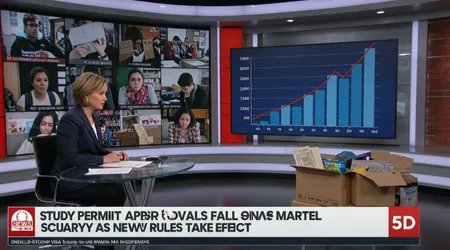Study Permit Approvals Fall Sharply as New Rules Take Effect

Study permit approvals fall sharply in 2025, signaling a seismic shift in Canada’s international education landscape.
Immigration, Refugees and Citizenship Canada (IRCC) implemented stricter regulations, capping study permits at 437,000 for 2025 a 10% reduction from 2024’s 517,410.
These changes, announced on April 23, 2025, aim to curb system misuse, enhance transparency, and prioritize quality education.
But what does this mean for aspiring students, institutions, and Canada’s global reputation as a study destination?
This article unpacks the new rules, their ripple effects, and why they matter.
Canada has long been a beacon for international students, with 94% of surveyed students in 2025 expressing interest in studying here, according to CIC News.
Yet, the tightened policies reflect a balancing act: maintaining high educational standards while addressing housing shortages and economic pressures.
The study permit approvals fall sharply narrative isn’t just about numbers it’s about real people, dreams deferred, and a nation redefining its priorities.
Let’s dive into the why, how, and what’s next.
Why the Clampdown? Understanding the Policy Shift
Canada’s decision to cap study permits stems from systemic strain. Housing crises and overburdened institutions prompted IRCC to act decisively.
The study permit approvals fall sharply trend began in 2024, with a 35% drop from 2023.
For 2025, IRCC set a cap of 505,162 applications, prioritizing master’s and PhD students who now require attestation letters.
The government aims to deter “diploma mills” low-quality institutions exploiting students. This protects genuine learners but narrows pathways for others.
Imagine Sarah, a Nigerian undergraduate dreaming of studying biology in Toronto. She now faces tougher hurdles, like proving financial stability upfront.
Economic pressures also play a role. International students contribute $22 billion annually, but housing shortages sparked public backlash.
The study permit approvals fall sharply policy seeks balance, ensuring students integrate without overwhelming infrastructure.
++ Liberals Pledge Faster Recognition of Foreign Credentials for Healthcare and Skilled Trades
Yet, critics argue it risks alienating talent in a globalized world.
The cap aligns with plans to reduce temporary residents to 5% of the population by 2026. This strategic pivot prioritizes long-term sustainability over short-term economic gains.
But does it undervalue the cultural richness students bring?
The study permit approvals fall sharply debate reflects Canada’s identity crisis: open or guarded?

The Numbers Tell the Story: A Closer Look
The study permit approvals fall sharply trend is stark in 2025 data. Only 437,000 permits were approved, down from 517,410 in 2024.
Rejections also surged, with 290,317 study permit applications denied in 2024, a 52% rejection rate, per posts on X. The table below breaks it down:
| Year | Study Permits Approved | Applications Rejected | Rejection Rate |
|---|---|---|---|
| 2023 | 560,000 (est.) | 250,000 (est.) | 45% (est.) |
| 2024 | 517,410 | 290,317 | 52% |
| 2025 | 437,000 | Data pending | Data pending |
This decline isn’t random it’s policy-driven. The study permit approvals fall sharply effect hits undergraduate programs hardest, while graduate students face new attestation requirements.
Universities like McGill report financial strain, as international tuition fees drop.
The numbers also reveal human stories. Consider Raj, an Indian engineering hopeful. His application, once a near-certainty, now faces intense scrutiny.
The study permit approvals fall sharply reality forces students to rethink plans, often turning to costlier alternatives like the UK or Australia.
Impact on Students: Dreams on Hold
For students, the study permit approvals fall sharply policy is a gut punch. Tighter financial proof requirements and limited permits create uncertainty.
Many, like Sarah, must navigate complex attestation processes or risk rejection. The emotional toll is real years of planning unravel overnight.
The policy also shifts demographics. Indian students, who surpassed Chinese applicants in recent years, face a 35% visa approval drop since 2023, per The Indian Express.
This could reshape campus diversity, reducing perspectives that enrich classrooms. Why should talent be sidelined by bureaucracy?
Some students pivot to other countries. Australia and Germany, with less restrictive policies, are gaining traction.
Yet, Canada’s unique blend of affordability and quality remains unmatched making the study permit approvals fall sharply policy a bitter pill for those excluded.
Read more: Conservatives Propose Stricter Background Checks for International Students
The ripple effect extends to mental health. Rejection letters crush aspirations, leaving students like Raj questioning their worth. Support systems, like campus counselors, are stretched thin.
The study permit approvals fall sharply saga demands empathy alongside policy rigor.
Universities in Crisis: Financial and Cultural Fallout
Canadian universities face a reckoning as study permit approvals fall sharply. International students, paying up to $40,000 annually, are a financial lifeline.
McGill and Waterloo report deficits, with enrollment dropping 45% beyond the expected 35%, per X posts. Budget cuts loom, threatening research and staff.
The cultural impact is equally profound. Fewer international students mean less diverse campuses.
Class discussions lose global perspectives, weakening Canada’s academic edge. Imagine a sociology seminar without voices from Asia or Africa progress stalls.
The study permit approvals fall sharply policy risks academic insularity.
Some institutions adapt by targeting domestic students, but the revenue gap persists. Smaller colleges, reliant on international fees, face closure risks.
The study permit approvals fall sharply fallout forces a rethink: can universities diversify income without sacrificing inclusivity?
Partnerships with global institutions offer a lifeline. Virtual exchange programs could maintain diversity, but they lack the in-person magic of Canadian campuses.
The study permit approvals fall sharply challenge demands innovation to preserve Canada’s academic legacy.
Canada’s Global Reputation: A Delicate Balance
Canada’s allure as a study destination remains strong, topping 2025 surveys despite the study permit approvals fall sharply policy. Yet, the cap risks long-term damage.
Competitors like Australia capitalize on Canada’s restrictions, luring students with streamlined visas. Canada’s edge affordability and multiculturalism could erode.
The policy also sends mixed signals. Welcoming refugees but restricting students confuses global perceptions.
International media, like Al Jazeera, frame Canada as cautious amid U.S. trade tensions, per April 2025 reports. The study permit approvals fall sharply narrative fuels skepticism about Canada’s openness.
On the flip side, the policy strengthens Canada’s reputation for quality. By weeding out dubious institutions, IRCC signals commitment to excellence.
The study permit approvals fall sharply approach is like pruning a tree painful but vital for growth. Will it yield a stronger system?
Rebuilding trust requires proactive outreach. Virtual fairs and clearer IRCC guidelines could reassure students.
Canada must prove it’s still a land of opportunity, despite the study permit approvals fall sharply hurdles, to maintain its global academic stature.
Looking Ahead: Navigating the New Normal

The study permit approvals fall sharply era demands adaptation. Students must prepare stronger applications, emphasizing academic merit and financial stability.
Advisors now play a crucial role, guiding applicants through attestation letters and visa nuances. Preparation is the new currency.
Universities can innovate by expanding online programs, blending affordability with access. Partnerships with industries could offset financial losses, creating pathways for graduates.
The study permit approvals fall sharply challenge invites bold solutions to sustain Canada’s academic ecosystem.
Policymakers face pressure to refine the cap. Public consultations, hinted at in April 2025 CTV News, could adjust quotas. Balancing housing and education needs is tricky but essential.
The study permit approvals fall sharply policy must evolve to avoid alienating global talent.
For students like Sarah and Raj, resilience is key. Alternative destinations or delayed applications offer hope.
The study permit approvals fall sharply reality tests determination but doesn’t extinguish dreams. Canada’s doors, though narrower, remain open to the determined.
Conclusion: A Crossroads for Canadian Education
The study permit approvals fall sharply policy marks a pivotal moment for Canada. It’s a bold attempt to protect a strained system, but at what cost?
Students face uncertainty, universities grapple with deficits, and Canada’s global image wavers. Yet, the policy’s focus on quality and sustainability offers hope for a stronger future.
This is Canada at a crossroads choosing between openness and caution. The study permit approvals fall sharply narrative challenges us to reimagine international education.
By fostering innovation and empathy, Canada can remain a beacon for global learners. The path forward lies in balance, ensuring dreams like Sarah’s and Raj’s find a home.
Frequently Asked Questions
1. Why did Canada cap study permits in 2025?
The cap addresses housing shortages, system misuse, and institutional strain, aiming for transparency and quality, per IRCC’s April 23, 2025, announcement.
2. How does the study permit cap affect international students?
It reduces approvals to 437,000, increases rejections, and adds requirements like attestation letters, making applications tougher, especially for undergraduates.
3. Can students still apply for study permits in 2025?
Yes, but with a cap of 505,162 applications, competition is fierce. Strong academic and financial proof is essential.
4. What can universities do to cope with fewer international students?
They can expand online programs, seek industry partnerships, or target domestic students to offset financial and cultural losses.
5. Will Canada’s study permit policy change soon?
Possible adjustments may follow public consultations, as hinted in April 2025 news, but no firm timeline exists.
